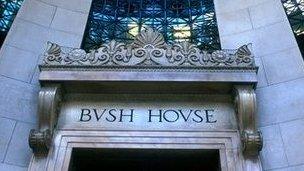Government grant for BBC World Service Trust
- Published

Some 650 jobs at the World Service are expected to be cut over three years
The BBC World Service stands to benefit from a £90m government grant.
The five-year grant between the BBC World Service Trust and the Department for International Development (DfID) will focus on 14 countries.
International Development Secretary Andrew Mitchell called the media "one of our most powerful tools": "We want to give people knowledge and a voice."
Last year, ministers announced the Foreign Office would no longer fund the World Service from 2014.
In October 2010, the government reduced the World Service's £237m annual budget by 16%.
In response to the cuts, the BBC said it would close five of its 32 language services and cut up to 650 jobs over three years.
Earlier this year, the World Service also announced that it would end radio programming in seven languages, including Russian, Mandarin Chinese and Ukrainian.
'Vital role'
The five-year grant follows suggestions by an MPs' committee in April to use part of the Department for International Development's (DfID) budget to make up the shortfall in World Service funding.
DfID is one of just two government departments to have its budget protected amid huge cuts.
The money will go directly to the BBC World Service Trust, a charitable organisation which works with hundreds of different broadcasters across the world - of which the World Service is one.
Funds will be aimed at social networking websites and mobile phone technology, as well as traditional radio output, in countries including Burma, Pakistan and the Palestinian territories.
"The Arab Spring showed how access to free and trustworthy information can have profound social consequences," said Department Secretary, Mr Mitchell. "We want to build on that."
"This grant recognised the vital role we play and will help us reach 200 million people across 14 countries over the next five years." said Caroline Nursery, director of the BBC World Service Trust.
However, a Trust spokesman said the grant would have only a "modest, indirect benefit" on the World Service, adding: "The World Service Trust is a charity that is legally and financially independent and has its own distinct mission."
The BBC World Service is currently funded by the UK government through parliamentary grant-in-aid, administered by the Foreign Office.
The service, which started broadcasting in 1932, currently costs £272m a year and has an audience of 241 million worldwide across radio, television and online.
- Published13 April 2011
- Published26 January 2011
- Published26 January 2011
- Published20 October 2010